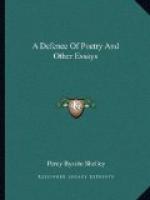Homer was the first and Dante the second epic poet: that is, the second poet, the series of whose creations bore a defined and intelligible relation to the knowledge and sentiment and religion of the age in which he lived, and of the ages which followed it: developing itself in correspondence with their development. For Lucretius had limed the wings of his swift spirit in the dregs of the sensible world; and Virgil, with a modesty that ill became his genius, had affected the fame of an imitator, even whilst he created anew all that he copied; and none among the flock of mock-birds, though their notes were sweet, Apollonius Rhodius, Quintus Calaber, Nonnus, Lucan, Statius, or Claudian, have sought even to fulfil a single condition of epic truth. Milton was the third epic poet. For if the title of epic in its highest sense be refused to the Aeneid, still less can it be conceded to the Orlando Furioso, the Gerusalemme Liberata, the Lusiad, or the Fairy Queen.
Dante and Milton were both deeply penetrated with the ancient religion of the civilized world; and its spirit exists in their poetry probably in the same proportion as its forms survived in the unreformed worship of modern Europe. The one preceded and the other followed the Reformation at almost equal intervals. Dante was the first religious reformer, and Luther surpassed him rather in the rudeness and acrimony, than in the boldness of his censures of papal usurpation. Dante was the first awakener of entranced Europe; he created a language, in itself music and persuasion, out of a chaos of inharmonious barbarisms. He was the congregator of those great spirits who presided over the resurrection of learning; the Lucifer of that starry flock which in the thirteenth century shone forth from republican Italy, as from a heaven, into the darkness of the benighted world. His very words are instinct with spirit; each is as a spark, a burning atom of inextinguishable thought; and many yet lie covered in the ashes of their birth,




